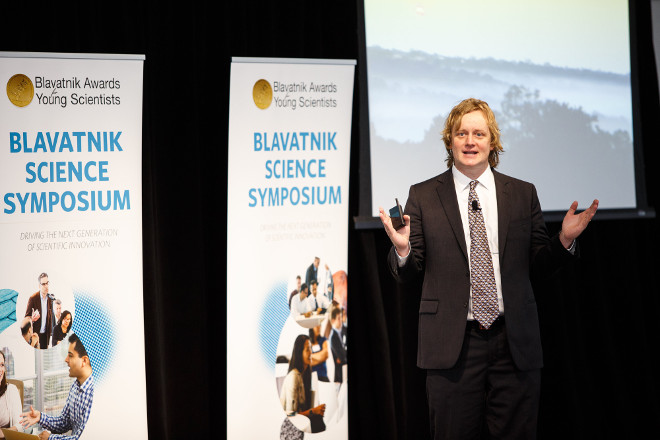
The annual Blavatnik Science Symposium brings together current and previous honorees of the Blavatnik Awards for Young Scientists to drive the next generation of scientific innovation. By inspiring the Scholars with talks about cutting-edge research and by fostering networking and collaboration between these brilliant scientists and engineers the symposium hopes to further push the boundaries of scientific progress.
The 2017 Blavatnik Science Symposium took place on Monday, July 17 and Tuesday, July 18, 2017 at the New York Academy of Sciences. The annual two-day event has been hosted for the past four years by the Blavatnik Family Foundation and the Academy. This exciting symposium convened Blavatnik Awards honorees from around the world in the fields of Life Sciences, Chemistry and Physical Sciences & Engineering—the three Blavatnik Award disciplines. Representatives from the Blavatnik Family Foundation, Harvard Business School’s Blavatnik Fellowship in Life Science Entrepreneurship and Harvard University’s Blavatnik Biomedical Accelerator also attended, along with academic luminaries and New York Academy of Sciences Council Members.
Over 150 distinguished scientists, business entrepreneurs and industry professionals from diverse disciplines were treated to two days of the latest research from Blavatnik honorees and interacted with panel participants. Scholars were invited to network between presentations, step out of the comfort zone of their scientific discipline and discuss ideas, challenges and successes in their research and areas of study. By approaching their work from the perspective of another’s disciplinary area, scientists have begun to brainstorm new ideas and problem-solve in entirely new ways, resulting in some highly productive collaborations between scientists who have met through the Blavatnik Awards program.
Ellis Rubinstein, President and CEO of the Academy, opened the Symposium with an overview of the development of the Blavatnik Awards for Young Scientists in 2007 as a regional program in the New York metropolitan area and the addition of the Blavatnik National Awards program in 2014. The thriving community of past honorees now numbers over 200 Scientists at the top of their respective disciplines. The benefactor of the awards program, Len Blavatnik, gave the audience some brief words including “Be Bold. Think Big.”
The Blavatnik Awards Program Director, Victoria Cleave, PhD discussed this year’s creation of the Blavatnik Awards in the United Kingdom and the Blavatnik Awards in Israel and gave an overview of the Symposium presentations for the two days. Brooke Grindlinger, PhD, Chief Scientific Officer of Scientific Programs and Awards of the Academy provided the opening remarks on day two of the symposium.
The first keynote presentation was given by 2017 Blavatnik National Laureate in Life Sciences Feng Zhang, PhD of the Broad Institute of MIT and Harvard. Dr. Zhang spoke about his groundbreaking work on the gene-editing technology CRISPR-Cas9. This was followed by 2017 Blavatnik National Laureate in Physical Sciences and Engineering Yi Cui, PhD from Stanford University who talked about his latest research in energy storage and the density and storage capacity of next generation lithium-ion batteries. A special Alumni Keynote presentation was given by Samie Jaffrey, MD, PhD from Weill Cornell Medical College who focused on his ground-breaking work surrounding mutations in gene regulation in neurological disorders such as autism and Fragile X syndrome.
Other sessions covered topics as wide-ranging as climate change, novel polymers and their applications, approaches to mapping the Ebola and Zika virus in the Americas and West Africa, quantum computers, modeling biological systems, and the formation of stars and black holes. An eBriefing with highlights of the entire program is available on the New York Academy of Sciences website.
Vicki Sato, PhD of Harvard Business School delivered a thought-provoking dinner keynote address on the “The Intersection of Science and Business.” She encouraged the audience to challenge the traditional uneasy relationship between science and business. “If we are going to move forward in a different way we need to build a more trusting and constructive relationship between science and business,” she explained.
Dr. Sato stressed the impact that science and business can have on society when they work symbiotically: “Scientific progress drives more economic value, globally, than any other advance. Science has the power to change the planet, maybe change the universe. Science has the potential to change how the world works so fast that continued investment in science is what is going to shape continued economic progress not just in our country but for countries globally.”